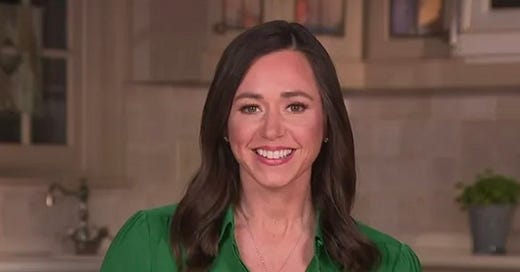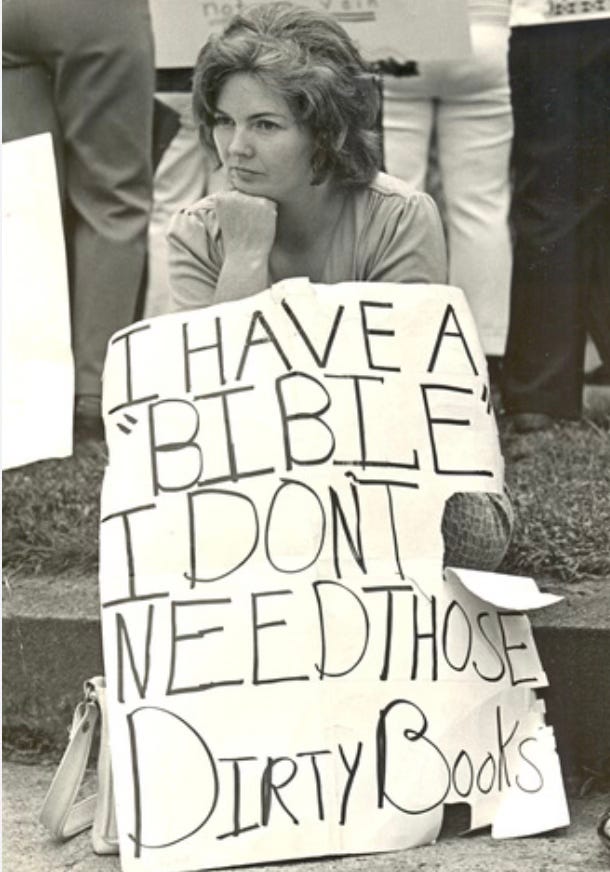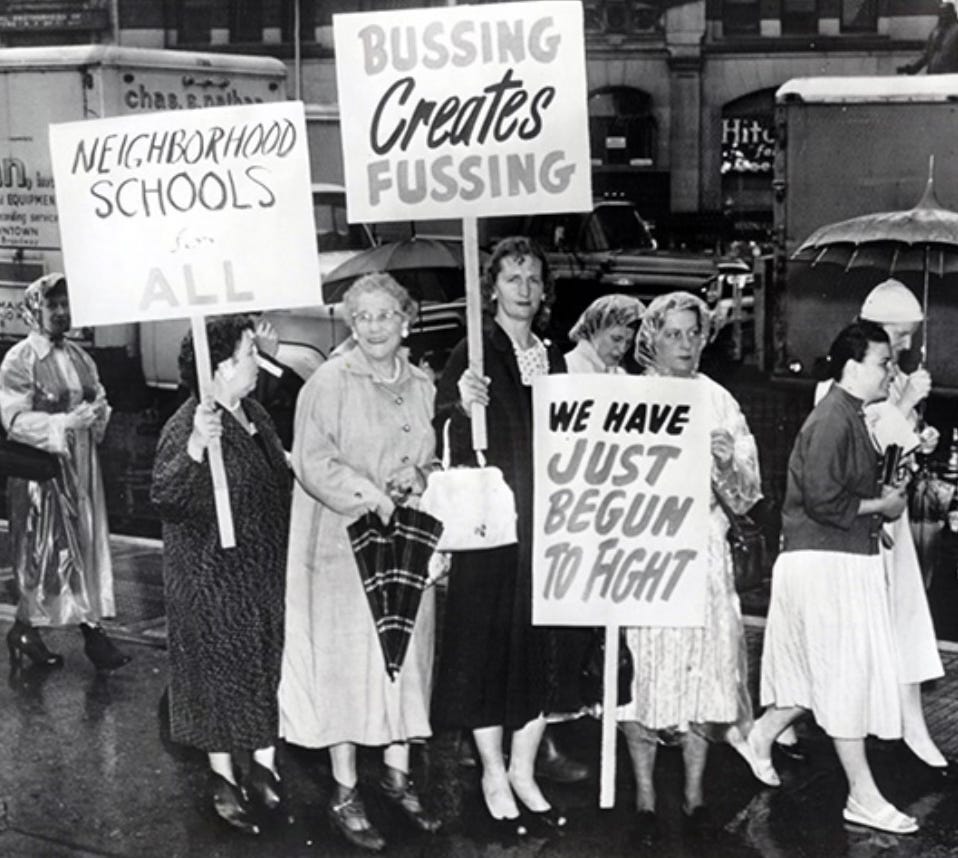For whom does the Senator pander?
A dialogue about the State of the Union response between two card-carrying "real parents"
Top notes: A bonus issue? In this economy? But what better way to kick off your weekend than with a White mom in Oakland and a White dad in Milwaukee trying to figure out why a White mom in Alabama wants them to be so afraid. That’s right, it’s a special
/ crossover episode, with the very wise . Thanks for hanging around with us.Last night, Senator Katie Britt delivered the Republican response to Joe Biden’s State of the Union address. Britt, aged 42, has the kind of resume that puts so many other ambitious millennial strivers to shame. The former student body president at the University of Alabama, Britt received her J.D., served as chief of staff for her Senate predecessor, and put in a stint as the CEO of the Alabama Chamber of Congress. That’s a heck of a biography! Like Britt, I too am 42 (well, for one more day) and I can’t describe my current occupation without sounding like a certain famous blond doll (ahem, my job is newsletter).
Britt didn’t lay out her resume last night, though. Nor did she appear behind a lectern, which might have been expected from a rising star in the Republican party, a stateswoman who obviously worked very hard to get to this position. While she acknowledged that she was a “Senator from the Great State of Alabama,” that was just a set up for the immediate addendum… “but that’s not the job that matters the most.”
Britt didn’t need to say the next line. She was sitting in her kitchen, at her literal kitchen table. Cross around her neck. Hair, millennial mom relatable. Green blouse, sensible. Skin, let’s just say it… white. She had just finished watching the state of the union in her living room, her husband Wesley by her side. How else would she address us, in this important moment in American history, but “as a wife and mother.”
And there was a clear us being addressed last evening. She was “welcoming us into her home,” her delivery urgent and breathy, at once sweet and conspiratorial, because she was concerned for US. At different points in her speech we were referred to as “hardworking parents,” “loving moms and dads” and, most pointedly, as “real families.”
But even though Britt addressed “parents” as a general category, she also made clear that she had a special message out there for her “fellow moms, many of whom will be tossing and turning at 2 a.m. wondering how they are going to be three places at once tomorrow and somehow still get dinner on the table.”
With that invitation in mind, I wanted to pull up an extra seat at my kitchen table (my newsletter is also a kitchen table? Just go with it) for an actual, authentic mom, one who is definitely still awake at 2 a.m., but perhaps not because she’s balancing school drop off with her duties on the Senate Appropriations Committee (both Sarah and I have chronic mysterious brain issues! Katie Britt may visit 2 A.M. but we were built for it!).
GB: Sarah Wheeler, author of Momspreading, co-host of the Mother Culture podcast, certified member of a REAL FAMILY, welcome. How did it feel being addressed so directly by a sitting U.S. Senator?
SW: I have to admit Garrett, I didn’t watch this last night. You know why?? Cause I was with my CHILDREN, where I BELONG and where I feel most whole, watching my five-year-old don an old wedding dress and perform an incredibly protracted dance as “The Great Rosabelle” while I shoveled Trader Joe’s short ribs into her mouth. We weren’t even AT the kitchen table, I don’t know what we were thinking.
But when I caught up with all 18 minutes of Britt’s address this morning, I audibly said things like “NO” and “are you kidding me?” and also, “NO NO NO NO NO NO” and made a face like I’d just lost a round of the game all mothers like me have likely played as they sorted through their toddler’s laundry– “poop or chocolate?”
It’s really, really hard for me not to go into full mockery mode here. I’m a good feminist and I hate to tear down a woman, so I won’t equate her acting to my own attempts to master the more serious portions of the Vagina Monologues in high school, or scoff at her offering up support of IVF to us like it was a free car, or wonder aloud why any sane person would name a child Ridgeway, or insist that she must have stolen the phrase “Rendezvous with Destiny” from her favorite porn.
What I WILL do is express my absolute horror, something I can still feel in my stomach and chest since watching this performance, that my own motherhood would be implicated in the widespread attempts of the Republican Party (I am not fully exonerating my own Democratic Party from evil, but Britt is asking us, duplicitously, to examine the aims of the Republican Party here) to strip me and my daughter of our control over our own bodies and motherhood, to criminalize us for being women, to endanger my children with an absolute torrent of legal and accessible guns, to control their gender identities, to separate children from their parents at the border.
I also feel deeply sad. Sad that this woman, who I have every reason to believe loves and fights for her own children, either believes that her party is going to reduce child care costs for families like hers and mine, or is willing to lie about it to gain power. It’s depressing, really. Equally depressing was her attempt to credibly invoke the idea of “word is bond.” Sorry, I couldn’t help myself.
GB: Other than that, Ms. Lincoln, how was the play?
But you’re so right. It is profoundly depressing. And it is so hard not just to mock it. To be clear, it was a sweaty, theatrical performance. And I can say that, because I was in an improv comedy troupe. At a liberal arts college. So I know bad acting. But even though she didn’t stick the landing, it’s clear what she’s going for. I loved this analysis from Jess Piper about the particular function of that voice in White fundamentalist culture. The message, to White upper middle class women, is “you’re safe with me, but only with me, so stay in the fold.”
And listen, it’s impossible to disaggregate everything that’s going on in Britt’s speech from the particular offenses of the contemporary Republican party. The contrast of the Senator from Alabama, the state bravely leading the charge against, um, in-vitro fertalization, claiming that somehow Central American immigrants are the greatest threat to American women is just too on the nose. The (not incorrect, mind you, but not exactly trenchant) liberal critique writes itself.
There’s another layer I couldn’t stop thinking about as I watched Britt’s speech though, and it echoes, I think, the deeper sadness you’re talking about. Sarah, this is the only way that we are ever addressed as parents by our elected leaders. The one moment that our parenthood– and especially your motherhood– is addressed (the assumption, of course, is that my fatherhood is not worth addressing because that must not be my animating identity as a man) is in the context of an implied threat. There are a couple assumptions there, of course, the first that the only children we care about are our own, and secondly that the primary way to exercise that care is to protect them from a frightening other– be that other a Black kid from Roxbury on a Boston Public Schools bus in the 1970s or a drag queen at a library today.
You’ll notice that I keep talking about a very specific “we” here, because the assumption inherent in this rhetoric has always been that a “mother” is a White mother in a heterosexual partnership with two-three presumably cis, straight, White children. And again, this isn’t just a product of contemporary Republican rhetoric. I mean, Sarah, thinking not just about your lifetime but your parents’ lifetime, can you think of a moment when the political pitch to parents hasn’t been, essentially, “White straight parents, you love your kids, right? Good, so the only way to exercise that love is by closing yourself off to the world and staying scared?”
SW: I think you’re getting at something I was feeling but couldn't articulate, even though I, too, was in an improv troupe at a liberal arts college and am thusly very good at talking before I’ve actually thought anything through! What pained me so much was that, of course I want to be addressed as a mother! Of course I want my motherhood to be cited as a means for revolution, or as she calls it “getting in the arena.” When she asks moms to think about if we are in a better place than we were three years ago, my response was, “yes and no.” Though I don’t wake up at 2:00 am because I know better and take a sleep aid every night, I do worry. I do feel paralyzed by my own fear for the world I am letting my kids inherit. I do want to be mobilized, and I do believe in the power of parents to effect positive change (the Sandy Hook Promise parents come to mind here as inspiration).
But it’s interesting to invoke 2020/2021, the span of time that contains the most anguish for me as a parent, and not acknowledge how unbelievably lawmakers on all sides screwed parents and allowed them to be screwed in the pandemic, with almost no lessons learned (other than a few statewide school lunch program changes, for which I am grateful). It does make a gal feel used!
And yes, she’s very clearly invoking “wife, mother, family” with a certain image in mind that was deeply uncomfortable. As I listened, I kept inserting the word “WHITE” into her phrases – “I worry my WHITE children might not get a shot at living their american dreams” – “We the WHITE people are still in the driver’s seat” – “The WHITE american dream has turned into a nightmare” – you get the idea.
I don’t want the lesson of this long-winded, grotesque showpiece to just be that we hate on this lady, even though she failed to mention, when citing that “our DNA contains the same ingenuity that put man on the moon” that our DNA also overlaps 60% with fruit flies. So what’s the lesson then? Is it that parents need to “get in the arena” for the causes that actually make our children safer and healthier, rather than these lies???
GB: How does that Kendrick Lamar song go again? “I’ve got the politics of resentment/the politics of resentment/and also fruit fly guts/inside my DNA.”
As for your question, yes! I think it means exactly that! And more! As we’ve been going back and forth, one thing that keeps coming up for me is that of course we’re terrible at imagining parenting as a revolutionary act of collectivism and community care. We (especially the middle class White we, and super especially the White male we) have been inundated with generations’ worth of messaging that the only kids that matter are our own kids, and that the sole end goal of parenting is for our children to win a bunch of really individualist races.
The antidote for that level of inculturation lies, I think, in a million big and little experiments in parenting as an art of interconnection. Here are a couple tiny ones I’ve noticed in the last couple days, neither of which are revolutionary in and of themselves, but that feel like building blocks. The first came, surprisingly, on social media. You probably saw it too. Our mutual pal Angela (who, it should be noted, has a particular level of wisdom on this topic) was celebrating her daughter’s birthday on Instagram, and her message was sweet and cute but also, in a non-hamfisted way, connected to fundraising efforts for families in Gaza. What struck me about it wasn’t the mechanics of it– mothers asking for money for good causes is not itself revolutionary– but the seamlessness of the segue. She was loving her daughter that day, and from that place of love couldn’t also help but think about mothers in a war zone.
The second example is why I always believe in having an organizing campaign in your back pocket. Here in Milwaukee, there’s a public school funding referendum coming around the bend. And I just love what that referendum has done for pick-up-hour playground conversations between parents. We’re still talking about all the fun/banal/stressful parent stuff (mostly what meals we’ve discovered that (a). Can be put together in less than ten minutes and (b). Might actually be eaten by a human child), but we’re also talking about all the kids in our district and what we all collectively owe each other as neighbors. And you know what? I leave those conversations feeling more connected to those other parents individually and with my heart open to a whole bunch of other parents who I’ll never meet.
I wish that I had playground pick-up time with Katie Britt. Not because I believe so deeply in my organizing skills that I think I’d magically persuade her. But because the story she’s telling is that the only thing that bonds her and I together as parents is our fear and myopia. And I just don’t believe that’s true. I don’t want to know what keeps her up at night at 2:00 A.M., but I do want to know about the kindest thing she ever saw her kid do for another kid.
I worry that feels too trite and tidy, though. This is heartbreaking. And the vision for the future that Britt is offering is so harmful. So what does all that make you want to do?
SW: Your calling forth interconnectedness, other than being so wonderfully you, does feel like a kind of resistance – or at least a complication to her narrative. It makes me wonder why (i mean, I know why, but this is for rhetoric’s sake), she didn’t stage a talk about parents and families at the playground, or the library, or at the neighborhood pizza joint that graciously gives kids free lollipops and puts lids on their cups, or outside of a public school (and our pal
made me realize that, interestingly, she didn’t call forth any of the school-related battles conservatives have been waging, perhaps because the goal of this talk was to keep it highly home-bound).Despite all my posturing about not buying into parental fear, I do have a lot of it (see above). Keeping me at my kitchen table keeps that fear, as you say, highly individualistic, hyperfocused on my own offspring. Taking my concerns, and my hope, as you call for, out into the world, is always, always a good thing. But that kind of collective work is usually anathema to the goals of cynical politicians – simply because it reminds us that we actually want a better world for all kids, not just our kids. I want dads in on this too, and trans or gender-queer parents, and those who are not parents, too. The idea that only parents care about the future is just as ridiculous as, well, almost everything in that speech.
So I guess I’ve got to fish around in my back pocket and see what’s there? I envy your pick-up conversations. Though I’m not sure if I have the bravery to start one up with a Katie Britt, maybe I need to move some of mine beyond the usual chit-chat. And I’ll tell you one thing – if she’s claiming the kitchen table for fearmongering and other-ing, I think we’ve got to get out of our houses and look for somewhere else to sit. See you at the communal table, friend.
If you want to support Sarah’s work, you can subscribe to her newsletter, Momspreading, follow her on Instagram or check out her podcast, Mother Culture (this episode on teacher’s strikes and parenting as protest links up nicely with today’s conversation).
If you want to support my (Garrett’s) work (do you see how I slyly referenced the fact that Saturday is my birthday… pretty slick) I’d love if you could pre-order my book, The Right Kind of White, which comes out on March 19th.
If you want to support an organization that has helped both Sarah and I think more collectively about our parenting: Check out Integrated Schools!









Y’all are two of my faves! Thanks for watching so I didn’t have to 🤣
I definitely didn’t see the speech so thank you. I do wonder when society will start making room for a less binary conversation about caring for children. Currently, we have parents who are the people who give birth to and house children ostensibly for the child’s entire life. This is very much a Leave It to Beaver concept of the family. Divorce, death of a parent, step parents, queer, trans and nonbinary parents, polyamorous parents, multiple people raising children in the same house, grandparents and other family as the primary parents, none of this is normalized in our political conversation around parenting (or most others about raising kids).
I love my partner’s kids. I financially support all of us. I care to check up on and advocate for their well-being. I don’t consider myself a parent but if I was a man I’d probably be anointed as the best stepdad ever long ago because the bar is in hell. But it also means that I have no socially acceptable role here not even a convenient title especially as a nonbinary person. We can do so much better to encourage this village approach by actually acknowledging the villagers and making it easier for us to have a role in kids lives. Most people don’t want to do such hard work and be told that they aren’t really helping or worse be cast in some icky savior role.